Monitor "BOOST PRESSURE SENSOR" parameter on the GDS
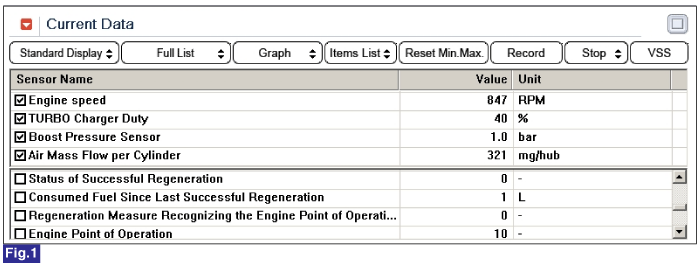
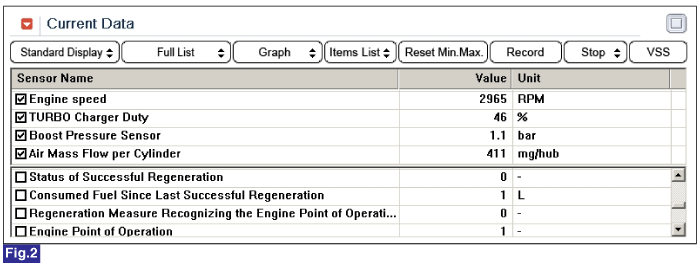
Fig.1) VGT duty at Idle
Fig.2) VGT duty at 3000rpm

VGT(Variable Geometric Turbocharger) is the device which increases the efficiency of turbocharger at low rpm and lasts optimum turbo efficiency at high rpm as varying the cross sectional area through which exhaust gas passes turbocharger impeller. It relieves turbo lag at low speed and increse engine power genetation.
Engine speed, APS signal, MAFS and Boost pressure sensor information is inputted to ECM.
ECM actuates vacuum diafragm which controls exhaust gas line as controlling VGT Control solenoid valve duty to maintain optimum state of air compression.
P0048 is set when excessive current is detected in VGT Control solenoid valve control circuit for more than 1 sec.. This code is due to short to battery in control circuit or internal short of VGT Control solenoid valve component.
Item | Detecting Condition | Possible Cause | ||
DTC Strategy | ● Signal monitoring | ● VGT Control solenoid valve circuit ● VGT Control solenoid valve component | ||
Enable Conditions | ● IG KEY ON | |||
Threshold Value | ● Short to battery | |||
Diagnostic Time | ● 1000ms | |||
Fail Safe | Fuel cut | NO | ||
EGR Off | YES | |||
Fuel Limit | YES | |||
Check Lamp | NO | |||
VGT Control solenoid valve component resistance | VGT Control solenoid valve operating Hz | VGT Control solenoid valve operating duty |
14.7 ~ 16.1Ω (20℃) | 300Hz | 79% at idle, decreases as accelerating |
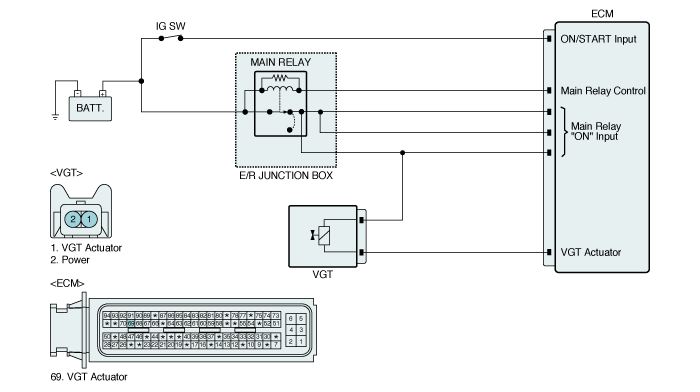
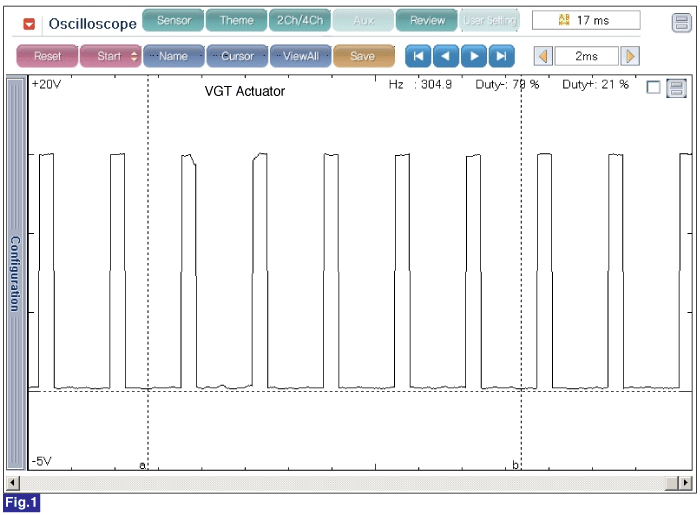
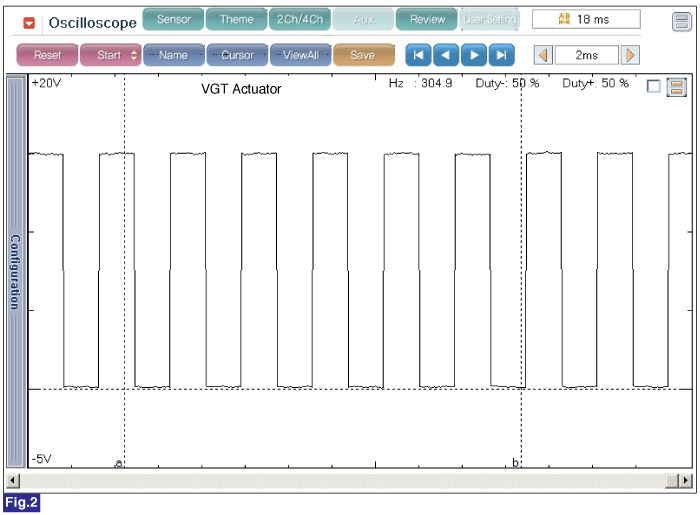
Fig.1) VGT Control solenoid valve output waveform at 79% duty. Duty decreases as boost pressure increases.
Fig.2) VGT Control solenoid valve duty decreased at acceleration.
Connect GDS to Data Link Connector (DLC).
Warm engine up to normal operating temperature.
Turn "OFF" electrical devices and A/C.
Monitor "BOOST PRESSURE SENSOR" parameter on the GDS


Fig.1) VGT duty at Idle
Fig.2) VGT duty at 3000rpm
Electrical systems consist of a lot of harness and connectors, poor connection of terminals can cause various problems and damge of component.
Perform checking procedure as follows.
Check damage of harness and terminals : Check terminals for contact resistance, corrosion and deformation.
Check connecting condition of ECM and component connector : Check terminal seperation, damage of locking device and connecting condition between terminal and wiring.
Disconnect the pin which requires checking at male connector and insert it to the terminal at female connector for checking connecting condition. ( after checking, reconnect the pin at correct position. )
Is the problem found?
 | ▶ Repair the trouble causing part and go to "Verification of Vehicle Repair". |
 | ▶ Go to "Power Circuit Inspection". |
IG KEY "OFF", ENGINE "OFF".
Disconnect VGT Control solenoid valve connector
IG KEY "ON"
Measure the voltage between power terminal of VGT actuator harness connector and chassis ground.
Specification : 11.5V~13.0V
Is the measured voltage within the specification?
 | ▶ Go to "Control Circuit Inspection". |
 | ▶ Repair INJ FUSE in E/R JUNCTION BOX and related circuit and go to "Verification of Vehicle Repair". |
Check monitoring voltage in control circuit
IG KEY "OFF", ENGINE "OFF".
Disconnect VGT Control solenoid valve connector
IG KEY "ON"
Measure the voltage between control terminal of VGT actuator hanress connector and chassis ground.
Specification : 3.2V~3.7V
Is the measured voltage within the specification?
 | ▶ Go to "Component Inspection". |
 | ▶ When voltage is not detected : Go to "2. Check open in control circuit" as follows. ▶ When high voltage is detected : Repair short to battery and go to "Verification of Vehicle Repair". |
Check open in control circuit
IG KEY "OFF", ENGINE "OFF".
Disconnect VGT Control solenoid valve connector and ECM connector.
Check continuity between control terminal of VGT actuator harness connector and ECM harness connector.
Specification : Continuity ( below 1.0Ω )
Is the measured resistance within the specification?
 | ▶ Repair short to ground and go to "Verification of Vehicle Repair". |
 | ▶ Repair open in control circuit and go to "Verification of Vehicle Repair". |
Check VGT Control solenoid valve component resistance
IG KEY "OFF", ENGINE "OFF".
Disconnect VGT Control solenoid valve connector.
Measure the resistance between control terminal and power terminal of VGT actuator connector (component side).
Specification : 14.7 ~ 16.1Ω (20℃)
Is VGT Control solenoid valve component resistance within the specification?
 | ▶ Go to "2.Check VGT Control solenoid valve operation" as follows. |
 | ▶ Replace VGT Control solenoid valve and go to "Verification of Vehicle Repair". |
Check VGT Control solenoid valve operation
IG KEY "ON", ENGINE "ON".
Check that VGT Control solenoid valve operating duty is 75% after warming engine up.
Check if vacuum generates after disconnecting VGT valve vacuum hose.
Check if vacuum generates when decelerating after rapid acceleration (VGT Control solenoid valve operating duty 9.8%).
Specification : VGT Control solenoid valve duty 75% : vacuum generates
VGT Control solenoid valve duty 9.8% : vacuum does not generate
 | ▶ Go to "Verification of Vehicle Repair". |
 | ▶ Replace VGT Control solenoid valve and go to "Verification of Vehicle Repair". |
※ Repeat this process 2~3 times.
After a repair, it is essential to verify that the fault is corrected.
After connecting GDS select "Diagnostic Trouble Codes(DTCs)" mode to and then clear DTC.
Drive the vehicle within DTC Enable conditions in General information.
After selecting "Diagnostic Trouble Codes(DTCs)" mode and check DTC is recorded again.
Are any DTCs recorded ?
 | ▶ Go to the DTC guide of recorded NO. in GDS. |
 | ▶ System operates within specification. |